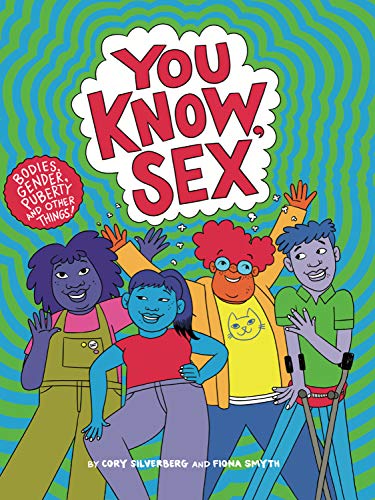What is Pleasure?
Pleasure is a feeling of happiness, satisfaction, or enjoyment. This video defines what is pleasure, describes activities that people can find pleasurable, and acknowledges how experiencing pleasure is a normal part of being a human being and should be celebrated. [AMZ-151]
Youth
Pleasure is an incredible feeling of happiness, satisfaction, or enjoyment that you experience. It’s like encountering something that makes you feel really good in your body and mind. You can find pleasure in many different ways – like traveling, experiencing new activities and making friends. All those things can bring you great joy. Sometimes some people may also find pleasure in movement from dancing to going on hikes. These physical activities can make you feel alive and happy.
As you grow older, you may also start exploring pleasure within romantic and intimate relationships. Some people find pleasure in emotional connections and others may find pleasure in physical touch. There are different ways people find pleasure in relationships. For example, it can feel great when a partner listens to your wants and needs, communicates openly and honestly, and shares intimate feelings with you. Physical touch is also a part of some relationships, like holding hands, kissing, and engaging in other types of intimate touch.
Some individuals find pleasure in masturbation, which means touching your own body, especially the genitals, for sexual pleasure. It’s important to know that people have different feelings about masturbation, and it’s okay whether you choose to do it or not. Masturbation is a normal and safe way to explore and learn about your body and your own sexual feelings.
Sometimes, when people engage in sexual activities with others or themselves, they may experience something called an orgasm, which is sometimes referred to as ‘climaxing’ or ‘cumming’. An orgasm is a powerful and pleasurable feeling that can happen during sexual activity. It often feels really good throughout the body, and there might be a warm or tingly sensation, particularly in the genitals. Some people may also experience ejaculation, where fluid is released from the penis. It’s important to know that not everyone experiences orgasms, and that’s completely normal. Many people still feel pleasure during sexual activities without having an orgasm. Pleasure can be enjoyed in different ways, and everyone’s experience is unique to them.
Sexual behaviors should bring physical, emotional, and mental pleasure to all participants. It’s important to remember that no one should ever pressure you into engaging in any activity, especially sexual behaviors, that you aren’t comfortable with, that don’t feel good, or that are painful. You have the right to say no if someone tries to pressure you into something that doesn’t bring you pleasure or feels wrong.
Experiencing pleasure in sexual activities is a great way to understand what you (and your body) enjoy or to connect intimately with another person. Experiencing pleasure is a normal part of being human and should be celebrated. It’s important to remember that some people find pleasure from sexual activity, and some don’t-both are normal!
Remember, everyone’s experiences and choices about pleasure are personal, and it’s important to respect, communicate, and understand your own boundaries and those of others. If you have any questions or concerns, it’s always okay to seek trusted and reliable sources for information and guidance – like a parent, another trusted adult or a healthcare professional.
FAQs
No, masturbation will not hurt you or cause any health problems. There are many myths about how masturbating will affect you, but actually it cannot hurt you physically, even if done frequently. It should feel good, and it can also relieve stress and be a physically safe way to express sexual feelings.
A lot of people believe that masturbation is a normal, healthy thing to do. While masturbation is very common, there are lots of different beliefs about it. It’s a good idea to talk with a parent or adult you trust to learn more about your family’s views about masturbation.
It’s absolutely true that many girls masturbate. In fact, most people do it at some point in their lives. That means it’s normal if you do, and it’s normal if you don’t.
Test your knowledge
Parents
Pleasure is an amazing feeling of happiness, satisfaction, or enjoyment that we all experience. It’s like encountering something that brings you a deep sense of joy in your body and mind.
As your child grows older, your child may also start exploring pleasure within romantic and intimate relationships. There are different ways your child may find pleasure in relationships. Pleasure in relationships can include your child communicating their wants and needs and sharing intimate feelings with their partner. Physical touch is also a part of some relationships, like holding hands, kissing, and engaging in other types of intimate touch.
There may be where your child will find pleasure in masturbation for sexual pleasure. It’s important to know that as a parent you may have different feelings about masturbation. It’s important to remember that masturbation is a normal and safe way to explore and learn about your body and your own sexual feelings.
When discussing pleasure with your child, open and honest communication is key. Before starting the conversation about pleasure, create a comfortable and non-judgmental space where your child feels safe to ask questions and share their thoughts. Remember that pleasure is a natural part of life and it’s important to approach the topic with sensitivity.
Throughout the conversation, encourage your young person to express their own interests and experiences related to pleasure. Let them know that it’s okay to have questions or curiosities about pleasure, and reassure them that they can come to you for guidance and support. Remember, when discussing pleasure, it is important to discuss boundaries and consent. Share with your child about respecting their personal boundaries and the boundaries of others. Consent is necessary in all aspects of pleasure and that it’s crucial to communicate openly and honestly with others.
Additionally, when discussing pleasure, be sure to emphasize the significance of making healthy and informed choices when it comes to pleasure. Overall, fostering a safe and open dialogue about pleasure with your child can help them navigate this aspect of life in a healthy and informed manner.
Conversation Starters
You can start the conversation by explaining with your child that pleasure is a normal and positive aspect of being human. Discuss and have examples of different activities and experiences that can bring pleasure, such as engaging in hobbies, spending time with loved ones, enjoying food, exploring nature, or pursuing personal interests. Be sure to share with your child that pleasure can be found in a variety of ways and can be unique to each individual.
Below are a few ways to start the conversation:
Have dinner together and talk about what is going on in your tween’s life. When they mention friends or classmates that have romantic partners, you can then use this time to talk about healthy relationship qualities and behaviors and what they would expect or want in a relationship
When you want to hug or kiss your child, getting your child’s permission first is a great way to demonstrate consent. If this is not something you have done in the past, you can explain why you are asking for their consent and begin the discussion about why it is important to gain consent—especially in sexual situations.
Opening conversations about pleasure with your child can be done in a thoughtful and supportive manner. Here are a few conversation prompts to begin the conversation:
- “I wanted to talk to you about something important that’s a normal part of life: pleasure. Have you ever heard or wondered about what brings you joy and happiness?”
- “As you’re growing up, you’ll start experiencing different feelings and sensations in your body. It’s completely normal to have questions or curiosities about pleasure. Is there anything you’d like to talk about or know more about?”
- “I’ve noticed you might be becoming more curious about your body and the things that bring you happiness. I’m here to listen and support you as we talk about pleasure and how it can be a positive and healthy part of life.”
- “Let’s have a conversation about pleasure and the different ways people experience joy. It’s important to understand that pleasure is unique to each person. Is there anything you’d like to share or ask about?”
- “I think it’s important for us to talk about pleasure, which includes feeling happy and satisfied. It can involve many things like activities, experiences, and even relationships. How do you feel about discussing this topic?”
Additional Resources
Educators
When teaching about pleasure to students, it’s essential to create a safe and inclusive learning environment where students feel comfortable and respected. Within your classroom, it is important to establish a respectful and non-judgmental space. As an educator you want to emphasize to your students the importance of open-mindedness, respect, and confidentiality when discussing a sensitive topic like pleasure. Encourage your students to ask questions and participate without fear of judgment.
Pleasure is a topic that you want to be sure to use language and concepts that are suitable for the age group of your students. Be mindful of the students’ developmental stage and ensure that the information shared is relevant and relatable to their experiences. Remind students that they can find pleasure in many different ways – such as through activities, relationships, and self-care practices.
It is important to normalize pleasure as a natural part of life and to introduce the concept of pleasure as a normal and healthy aspect of being human. As pleasure is normal and healthy, be sure to teach students about the importance of consent in all aspects of pleasure. Discuss the significance of respecting personal boundaries and seeking affirmative consent in any activity involving pleasure with another person. Help students to understand the difference between healthy, consensual experiences and unhealthy or non-consensual situations.
Remember, each student will have varying levels of knowledge and understanding about what pleasure means. It is important to provide accurate information to dispel myths and misconceptions surrounding pleasure. It is okay to challenge stereotypes and biases related to pleasure, ensuring that students have a comprehensive and inclusive understanding of the meaning of pleasure.
If there are questions about pleasure that you are not comfortable answering, offer students access to appropriate resources, such as our AMAZE website, books, and articles that can provide additional information and support. Do not forget to encourage students to speak to a parent or another adult that they trust if they have additional questions regarding pleasure.
National Sex Ed Standards
Describe the human sexual response cycle, including the role of hormones and pleasure
Describe effective ways to communicate consent, personal boundaries, and desires as they relate to intimacy, pleasure, and sexual behavior
Demonstrate ways to show respect for the boundaries of others as they relate to intimacy and sexual behavior
International Technical Guidance on Sexuality Education
Discussion Questions
- How is pleasure defined?
- What are some examples of activities that can be pleasurable?
- What are some ways that a person can express pleasure in relationships?
- Did anything in this video surprise you? Did you think the video covers things about masturbation that might surprise people?


